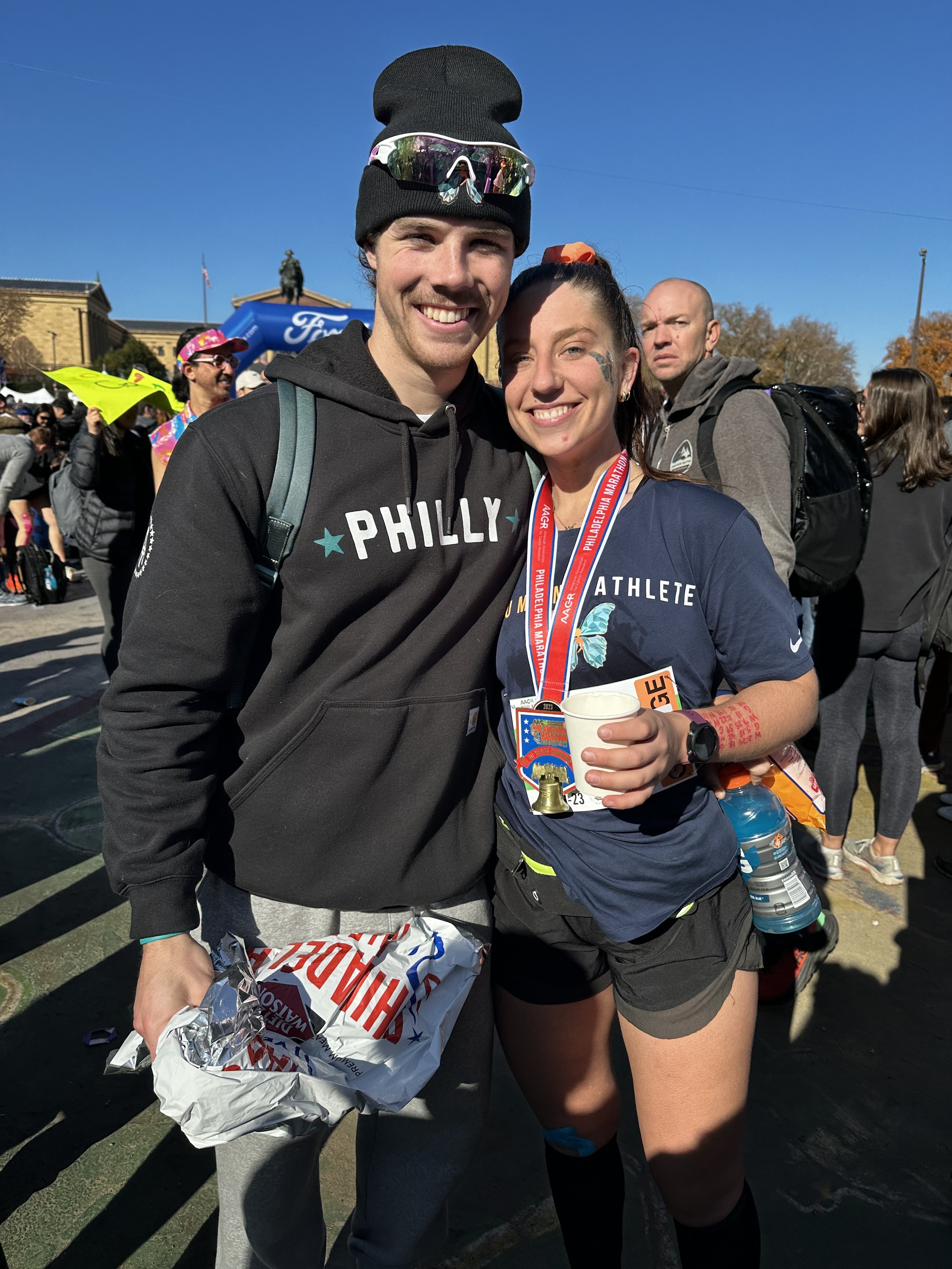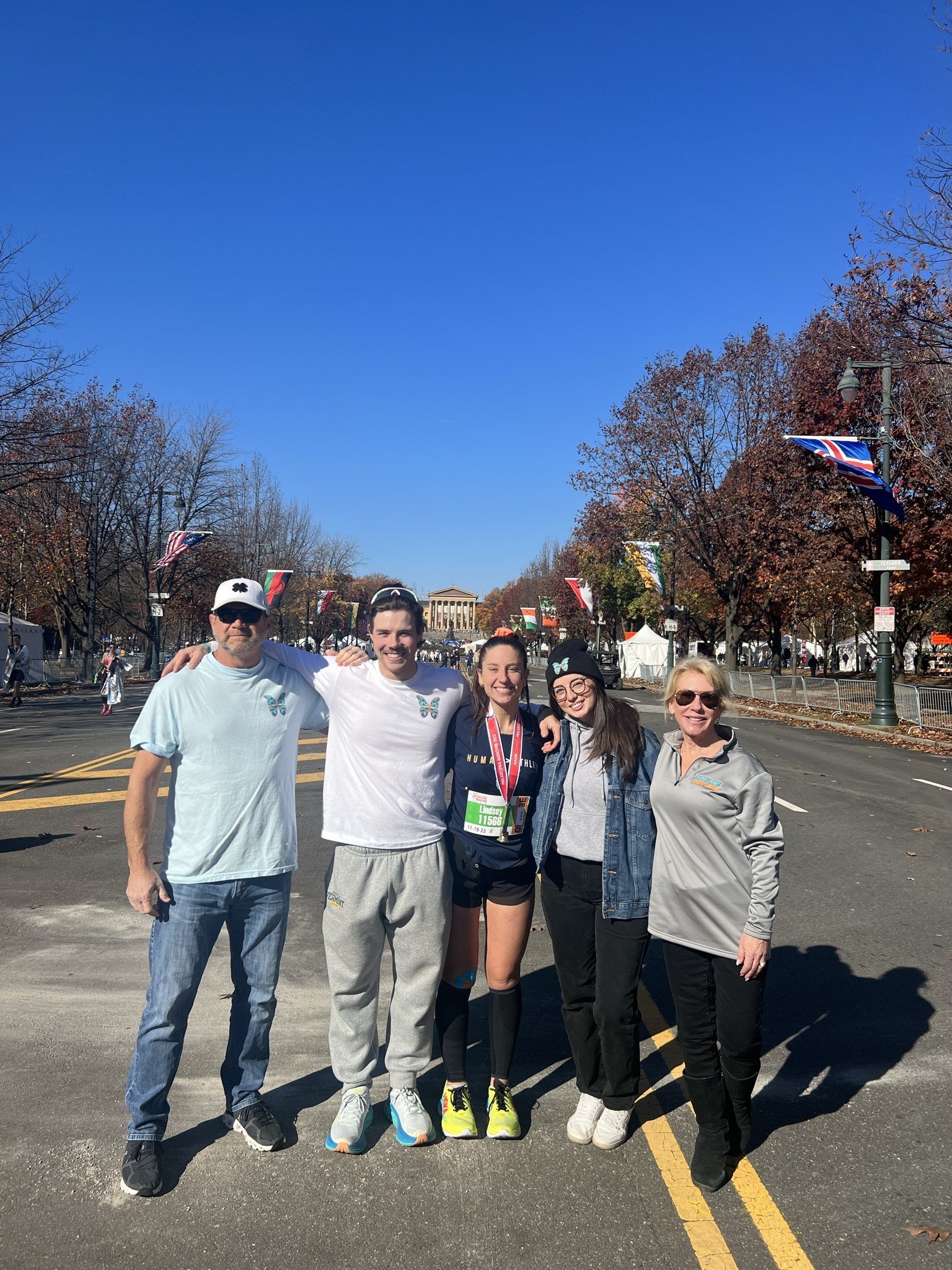26.2 for 9
By Lindsey Kilpatrick | IG: @lindseykilpatrickk
In November I ran my first ever marathon. Thinking back on the months of training, I see it all in grueling detail, but at the same time, I have no idea how exactly I got there.
The past two years after the end of my Division I field hockey career has been filled with new experiences, but also many challenges. Because of my work with Morgan’s Message, I felt relatively prepared for the feeling to come – a lost identity with the sport that has encompassed you as an individual suddenly gone. But the truth is, there is no amount of preparation you can do to know what that is going to feel like.
Moving halfway across the country to a new city where I knew no one to start an intense two-year masters program gave me an opportunity to redefine myself outside of the sport. However, what happened was a feeling that no one understood. No one understood why I would mention that I played field hockey when they asked me where I went for undergrad. It was a knee jerk reaction. It still is, and always will be an integral part of my identity. My field hockey career shaped me into the woman I am today. No words can express the magnitude and uniqueness of being a collegiate athlete. I was provided the answers to all of my questions - whether I liked it or not. My teammates would be my group of friends for the next four years. My captains would tell me what to wear. My strength coaches would tell me how much to lift. My academic advisors would tell me the only class schedule that fit with practice. And my coaches would tell me where to be, what to do, and what to eat.
In starting grad school, I was greeted with a new set of freedoms but in some ways, I felt more trapped than ever. I didn't have my people around me. I had 24 hours of my day where I could decide where I wanted to be and what I wanted to do. But it was too many choices. Part of why I did so well as a college athlete was because I thrive off of a busy schedule so free time was terrifying. Naturally, I got two jobs to fill both the free time and my empty bank account.
The first year was hard but I caught my footing. I found my people and got a good balance between school, work, and social life. I developed a love for cooking and watched about 10 seasons of Hell's Kitchen - but I didn't work out at all.
I was always striving to be the fittest in my athletic career. I thought if I'm not going to be the best on the field, I'll be the strongest in the weight room. I thought I genuinely loved working out. It wasn't until field hockey was gone that I realized it was solely motivated by fear. Fear of stagnating. Fear of not being strong enough. And fear of someone being stronger than me.
So how did I start training for a marathon? I'm not entirely sure. It has always been on my bucket list, and I wanted to fall in love with working out again. My body had never felt so weak, and I knew I wasn't being responsible about my mental health and my unhealthy body let my anxious thoughts get a stronger grasp on me. Some people in my life were training or had recently completed a marathon, so I started by looking up some running plans just to see what training for a marathon would be like. I truly had no intention of running one, but it gave me motivation to start running again.
So I did. The first decision I made, which I would give as advice to any former athlete trying to get back into the groove is I didn't time it. In the year prior, I would try to run and immediately get discouraged because … surprise surprise … I wasn't as fast as I was in field hockey season! I knew I had to start learning how to listen to my body and trust what it was telling me rather than letting my perfectionist brain but in.
After getting into a rhythm, I thought maybe a marathon would be the motivation I need to stay bought in. The Philadelphia Marathon was the same week as Thanksgiving (in my adopted hometown) so I thought what the hell.
When I started training there were a lot of barriers. It was hard to do things like running at a sustainable pace because in field hockey it was all or nothing. When was I ever jogging? Never. The other difficulty I had was adapting to just mindlessly running into the ether for hours. At first, I started listening to podcasts or audiobooks, which also helped me slow down a bit. Still I would hit mental walls so I had to reframe my mind to think, ‘If you were on the field right now and you had a ball in front of you would you just stop?’ Of course not! It is a long time before reward is given to you in distance running compared to a sport like field hockey with many quick challenges. Finally, the biggest adjustment was not pushing through injuries. I cannot think of one season where I was healthy in my college career. However, I had to prioritize future me and remember as much energy as I was putting into a long run now it was still just training.
I'm a few weeks post marathon and I ran for the organization that has saved my life and so many others. I did this for post-field hockey me. I did this for the little girl that would think marathon runners were superheroes. But most importantly I did this for Morgan. It is crazy how close you can feel to someone you have never met but I know with certainty that she brought me to Morgan's Message - first as an ambassador, but now as an official part of the team. Every day I am grateful for my Morgan's Message family. I feel a different bond with them than I have ever felt with anyone in my life. So with all of this uncertainty over the past two years, one thing has always been there: Morgan's Message. That's what gives me peace and reassurance that I'm on the right path.
During the race, I ran with my Morgan's Message butterflies and my ‘Human > Athlete’ shirt, I saw my family and friends at mile 9 and finished an incredible athletic feat that I know I wouldn't have been able to do without Morgan’s Message coming up on my Instagram FYP in March of 2021 and picking me up from my lowest of lows and getting me back in the classroom, and on the field.
I ran 26.2 for 9!!!
Linds :)


